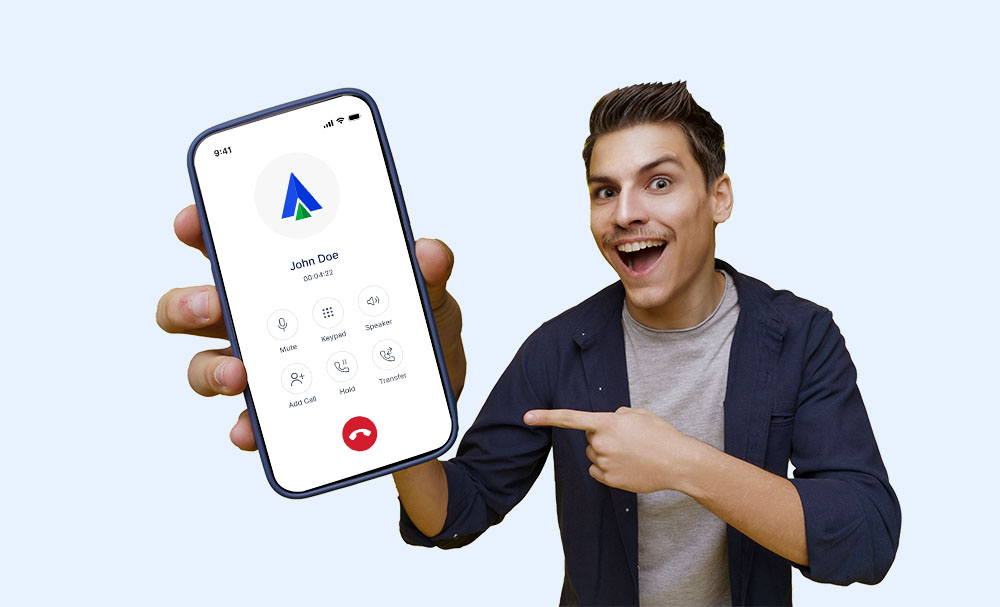Customer behavior has drastically changed over the years. Their expectations have grown tremendously, especially when it comes to experience. According to a recent study, 86% of customers say they would leave a brand after even a single bad experience. Hence, improving communication has become integral to enhancing customer experience.
Out of the various channels of communication, calling still remains one of the most popular. To ensure seamless incoming and outgoing calls, you need a phone setup and more importantly, a virtual phone number.
In this article, we will discuss the main points to keep in mind while procuring a Virtual Number. But first, let’s understand the functioning of virtual numbers and how they fit into a business.
What is a Virtual Phone Number?
As the name suggests, a virtual number is a phone number used to make business calls without any physical identity attached to it. When deployed intelligently, these numbers aid in revenue generation and improve customer loyalty. Unlike wired telephony services, virtual mobile numbers operate through the Internet with voice over internet protocol (VoIP) technology. They can route calls to a variety of telephone numbers like landlines and mobile.
Cloud-based virtual phone systems offer a wide range of solutions and products. Since the cloud isn’t limited to the product portfolio, it offers a myriad of features alongside virtual number solutions. An efficient Interactive Voice Response (IVR) can be easily paired up with your number. This is the perfect combination for any size and type of business.
Although virtual numbers are generally packed with features, the variety offered fluctuates across service providers. Needless to say, you should opt for numbers that present robust features like IVR integration, auto-attendant, comprehensive reporting and automatic SMS alerts.
Virtual Vs. Regular Phone Number: What Is the Difference?
Understanding the key differences between virtual and regular phone numbers can help you choose the right solution for your needs. Here are a few:
| Feature | Virtual Phone Number | Regular Phone Number |
| Technology | Cloud-based, operates over the internet | Traditional landline or mobile network |
| Device Dependency | Can be used on any internet-enabled device (PC, mobile, VoIP phone) | Tied to a physical SIM card or landline |
| Mobility | Accessible from anywhere with an internet connection | Limited to a specific device or location |
| Call Forwarding | Easily forwards calls to multiple numbers or devices | Usually forwards to only one number |
| Scalability | Easily scalable for businesses without extra hardware | Requires additional lines and hardware for scaling |
| Cost | Often more affordable with flexible pricing plans | Can be expensive with fixed contracts and higher call rates |
| Features | Advanced features like IVR, call recording, analytics, and AI-powered routing | Basic calling and voicemail features |
| Setup Time | Quick and hassle-free, no physical installation needed | Requires SIM activation or landline installation |
| Best For | Businesses, remote teams, and global operations | Personal use and local businesses |
Why Are Virtual Numbers Gaining Popularity?
The demand for virtual numbers is increasing at a rapid pace, and for good reason. Businesses across various industries are embracing them to enhance customer communication, reduce costs, and build a stronger brand presence.
Unlike traditional phone systems, virtual numbers offer unmatched flexibility. They help you establish a local or even international footprint without physical infrastructure.
Read this blog “VoIP Vs Landline” here.
Here’s why more and more businesses are making the switch:
Establishing a Strong Local Presence
Maintaining a local presence is essential for building trust and credibility. Customers are naturally more inclined to call a number that appears local rather than a long-distance or international one. Virtual numbers help you achieve this by offering phone numbers with specific regional codes, creating a sense of familiarity for customers.
This is especially beneficial if you are operating in multiple cities, as you can establish a virtual presence in different locations without opening physical offices.
Significant Cost Savings
One of the most compelling reasons to adopt virtual numbers is the substantial cost savings they provide. Traditional phone systems require separate landlines, additional SIM cards, and expensive telecom infrastructure. All of this can quickly add up.
However, with a virtual number, you can significantly cut down on these expenses. Since calls can be forwarded to any device, employees don’t need separate business phones. This makes it easier and more cost-effective to manage communication. Additionally, for handling high call volumes, you can set up multiple call-forwarding options, ensuring that no customer inquiry goes unanswered.
Enhanced Flexibility for Remote Work
Virtual numbers enable your employees to answer calls from any device, whether it’s a mobile phone, laptop, or desk phone. This ensures uninterrupted communication, whether team members are working from home, traveling, or managing a remote work.
Your team no longer needs to be tied to a specific location to receive business calls, which improves productivity and customer service. Whether an employee is at home, on a business trip, or working from a co-working space, they can seamlessly stay connected with clients and colleagues through a virtual number.
A More Professional Business Image
If you are looking to enhance professionalism, a virtual number is the way to go. With it, you get a dedicated business contact, eliminating the need for employees to use their personal phone numbers. This separation between personal and business communication not only boosts credibility but also ensures consistency in customer interactions.
Sometimes virtual numbers might also come with advanced call management features such as Interactive Voice Response. IVR allows you to set up an automated menu system—like “Press 1 for sales, Press 2 for support”—ensuring calls are routed to the right department efficiently. This structured approach to call handling enhances customer experience and streamlines business operations.
Types of Virtual Numbers Businesses Can Use
Different businesses have different communication needs. Virtual numbers come in various types to cater to these requirements:
Local Virtual Numbers
Local virtual numbers are designed for businesses that want to establish a strong presence in specific cities or regions. These numbers come with area codes such as +91-22 for Mumbai or +91-80 for Bengaluru, giving the impression that the business is locally based.
Toll-Free Virtual Numbers
Toll-free virtual numbers, commonly formatted as 1800-XXX-XXXX, allow customers to reach businesses without incurring any call charges. This makes it easier for your leads to inquire about services, leading to higher engagement and customer satisfaction.
Businesses that rely on customer support teams to handle large call volumes—such as banks, e-commerce platforms, and telecom companies—frequently use toll-free numbers to provide seamless customer service. Since the cost of calling is not a concern for customers, toll-free numbers encourage more inquiries, making them an excellent tool for lead generation and customer retention.
International Virtual Numbers
International numbers offer you a seamless way to expand your presence without the need for a physical office in different countries. You can get virtual numbers with international codes, allowing customers in those regions to contact you easily. .
Vanity Numbers
Vanity numbers are designed to be easy to remember and often incorporate words or patterns that reflect a business’s brand, such as 1800-BUY-NOW or 1800-TRAVEL. These numbers not only enhance brand recognition but also make it easier for customers to recall and dial them when needed.
How to Get a Virtual Phone Number?
Virtual phone numbers are easy to procure and easier to implement with the ‘right’ service and provider. Here’s what you need to look for:
Assess The Type of Virtual Numbers
Cloud telephony providers offer a variety of contact solutions—local, toll-free, and vanity or premium numbers. Local numbers help you overcome geographical barriers by creating a presence in varied locations across the globe. For example, you can buy a local number for Rajasthan while operating your business from Delhi.
Further, customers are motivated to call toll-free numbers as they are free of cost; the charges are borne by the business instead. These numbers usually begin with “get 1800 Number” and are deployed specifically to encourage people to call businesses. Vanity or premium numbers have an even greater recall value. For example, 9988776655 is a promising number, albeit at a higher price.
Focus on Maximum Automation
The main objective while searching for a suitable service is always for smoothened workflows and accelerated automation. Therefore, your virtual number solution should also offer features such as IVR or automatic SMS alerts, allowing you to gather information and resolve queries. Moreover, with intelligent AI, you can improve first call resolution through skill-based routing.
With a multitude of features available, why settle for mediocre service? Make sure you opt for a combination of power-packed features for streamlined operations in your call centers.
Aim for Better Call Management
If your virtual number solution is packaged with the right features, it acts as a sophisticated call-management suite that can better equip you to manage heavy call flows. A robust IVR acts as an auto attendant and lets you transfer, route and forward incoming calls in multiple ways—saving your agents’ time and energy. Managers can also evaluate customer interactions using the analytical dashboard and thereby aim for higher service quality.
Explore Ways to Track Missed Calls
Every missed call is a missed opportunity for your small business telecommunication solutions. While comparing service providers, you should cross-check if the solution is backed by a tracking tool for missed calls. Coupled with automated SMS service, you can receive timely intimation of missed calls and improve your communications.
Employ Comprehensive Reporting
With the advent of omnichannel customer communication, call analytics have become imperative for smoothening your business processes. The dashboard allows you to access every little detail of the virtual number, including call recordings, missed calls and even the quality of answered calls. It also lets supervisors assess their agents’ interactions in real-time, and through comprehensive reports that provide useful insights to improve CX.
Continue Using Your Existing Number
The option to convert your existing business number into a virtual number helps achieve a better work-life balance and also creates a strong brand identity that customers feel confident to reach out to. Additionally, you save on the marketing cost for a new number and you’re able to maintain a certain volume of calls since your number is already saved by the customers. Multiple extensions can be added to the line to streamline the channels further.
Pay Attention to Post-Purchase Support and Assistance
Even with a variety of features in your favor, customer support remains a crucial differentiator for your brand. Offer unlimited customer support by using multiple communication channels—calls, emails and chats. A pleasant CX also implies maximum uptime, ideally no less than 99.99%.
Summing Up
Given the huge demand for cloud telephony solutions in the marketplace, there’s a wide range of service providers to choose from. You can benefit from a virtual number in many ways. However, it is imperative to mindfully choose the best-suited solution since it will act as a single point of contact for your business and facilitate centralized communication. In addition to features, the appearance of your virtual number is also a vital point to be kept in mind while opting for one.
Discover more about virtual numbers with Acefone.
FAQ:
Yes, virtual phone numbers are secure when provided by a reliable phone service. Many providers use encryption, call recording safeguards, and secure call routing to protect customer data. They also implement strong security measures and maintain industry certifications such as ISO 27001, PCI-DSS, and SOC to protect user data. You can use these virtual numbers for outreach, while also managing incoming calls related to support efficiently.
Yes, virtual phone numbers can be traced back to the phone service provider. While you can use them to establish a local presence with local toll-free and vanity numbers, law enforcement can track them if necessary. Despite this, with the right provider, you can remain assured of privacy benefits when making or receiving calls.
WhatsApp may work with a virtual number, depending on the provider and number type. While some local and toll-free numbers can be used, others, such as certain vanity numbers, may not support verification. If you plan on using virtual phone lines for customer interactions, you should check compatibility before integrating WhatsApp with their service.














